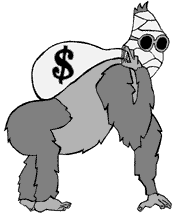GREG NICKELS and Mark Sidran were probably ecstatic, after the Sept. 18 primary, to think that they had eliminated a third major candidate and had only each other to worry about.
Wrong.
There is, in fact, still a third presence in this campaign, an invisible gorilla that will control City Hall, regardless of who gets more votes on Nov. 6. The invisible gorilla is Seattle’s rapidly deteriorating economy.
So far, Sidran has honed in on only one issue in his campaign: abolishing light rail, which the mayor can’t really do. But that’s one more issue than Greg Nickels has raised. Beyond that, Sidran says he’s a tough leader, and Nickels markets himself as a nice guy.
(Please, please don’t tell me this is the best Seattle has to offer.)
Sidran unquestionably got a huge boost from the events of Sept. 11. Almost nobody voted in what was already an off-year primary, meaning that the turnout skewed toward older, more conservative voters; the shadow of terrorist attacks also couldn’t help but boost a law ‘n’ order guy. As more people vote in November, and with (we hope) more emotional distance between us and terrorist horrors, Nickels will benefit quite a bit.
But the wild card, more monkey than monkey wrench, is our economy. Boeing is shedding jobs in the area like a snake sheds skin. Local financial services, already reeling from our dot-com bust, are taking a huge hit. The financial markets lost 15 percent of their already receding value in the week after the attacks. Gov. Gary Locke, perhaps the most fiscally conservative, numbers-geek politician in our state, is using the word “recession.” This is after four years in which the city of Seattle was flush with more money than it had ever had. Paul Schell was able to add 1,000 new city jobs and pass enough big-ticket ballot measures to buy off just about every noisy constituency in the city (too bad about WTO and Mardi Gras).
What this means, quite simply, is that our next mayor is going to have to hurt some people. The city charter requires a balanced budget, and with revenues sharply declining, it won’t be achieved just by looking for yet more “redundancies” and “efficiencies.” We’ll need big spending cuts: payroll, social services, constituent services, and law enforcement.
SIDRAN IN THE DRIVER’S SEAT
One of the most important things a mayor does in Seattle is give City Council a budget. And neither remaining candidate is talking about their priorities in Seattle’s grim new financial world. All we know thus far is that Greg will feel our pain, and Mark will feel our pain and enjoy it.
So far, Sidran has driven the race, not Nickels. Greg began campaigning for this job—again—18 months ago, and most people still have no idea who he is or what he’d do in office. There are stark ideological differences between him and Sidran, and he’s done very little to highlight them. Perhaps he considers that part of the “Seattle Way,” that it’s rude to point out, for example, that your opponent once shot a man in Reno just to watch him die. Instead, Greg gives us his pipe, cardigan sweaters, and beautiful-day-in-the-neighborhood schtick. (“Can you say, ‘re-ces-sion’? . . . I knew you could. Will you vote for me in 13 years?”)
That’s just what Sidran needs. Sidran has a 12-year record, as city attorney, of transforming a job that normally was run as a more or less apolitical office into a platform for appealing to the city’s racial and class bigotries. Now that the spotlight is on Mark and a lot more people are paying attention, the Sidran campaign must pretend that his record was forceful yet benign. Sidran has both a personal fortune for TV ads and editorial cheerleaders at the daily papers to hammer this theme home for him.
Mark Sidran should not be mayor of Seattle. There is a basic ideological disconnect between most citizens of the city of Seattle and its civic elite, and it has showed up painfully in this year’s ugly mayoral contest. Much of the city finds both candidates unpalatable. The temptation is to stay away from the voting booth. But there is too much at stake, especially with Sidran’s record on civil liberties. And both candidates owe it to the city to explain, in detail, how they would respond, as mayor, to the gorilla in the third seat.







